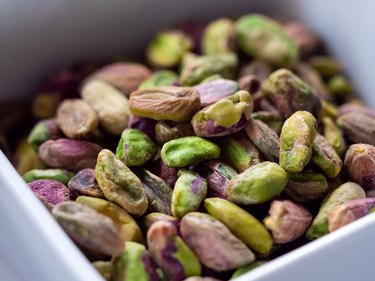

Loading your plate up with greasy bacon strips and salt-laden cured meats every day isn't the best choice for keeping your heart healthy. While these foods may satisfy your tastebuds, when it comes to your ticker, going ham on red, fatty and processed meats is less than ideal because they tend to be high in saturated fat and sodium.
Eating more protein is associated with an increased risk for heart failure, per a May 2018 study in Circulation: Heart Failure. That said, there are different types of protein — and many of them can be good for lowering cholesterol and blood pressure and reducing your risk of stroke and heart attack.
Video of the Day
Video of the Day
"It's important to note that while a high-protein diet may increase the risk of heart disease, a low-protein diet is also detrimental to heart health, and the right amount for you is important," says Michelle Routhenstein, RD, CDE, a cardiology dietitian at EntirelyNourished.com. "Protein helps to maintain lean body mass, bone mineral density, oxygen transport and antibodies, and helps with signaling pathways in the body."
The best type of protein foods for your heart are those low in saturated fat and high in heart-supporting nutrients, such as omega-3 fatty acids, butyrate, zinc and vitamins B12 (cobalamin), B6 (pyridoxine) and B2 (riboflavin) and selenium, Routhenstein says.
"Studies show that replacing fatty meats with fish, beans, poultry and nuts can significantly reduce your heart disease risk. These proteins offer up healthy fats and fiber that promote better cholesterol and less inflammation," says Bianca Tamburello, RDN, a dietitian with FRESH Communications.
For example, salmon and nuts have unsaturated fats that are beneficial for your heart. And plant proteins like beans and lentils are loaded with fiber to help reduce LDL cholesterol.
So if you're looking to improve your cholesterol and blood pressure, here are the best proteins that are good for your heart.
Best Nutrients for Heart Health
- Unsaturated fats (including omega-3s)
- Butyrate-producing proteins
- Fiber
- Zinc
- Vitamins B12, B6 and B2
- Selenium
- Manganese
- Calcium
- Magnesium
- Potassium
Nutrients to Limit for Heart Health
- Saturated fat
- Trans fat
1. Fatty Fish
Fatty fish, such as salmon and sardines, is one of the best foods for your heart because they provide omega-3 fatty acids, which are linked to better triglyceride levels and less plaque build-up in the arteries, Tamburello says.
For example, a July 2021 review in Nutrients observed that eating just 0.7 extra ounces of fish per day was linked to a 4 percent decreased risk of heart disease.
There are three different types of omega-3s: alpha-linolenic acid (ALA), eicosapentaenoic acid (EPA) and docosahexaenoic acid (DHA), according to the National Institutes of Health (NIH). You get ALA mostly from plant sources, like flaxseed and soybeans, but DHA and EPA are found in fish and other seafood.
"Sardines are jam-packed with omega-3 fatty acids, particularly EPA and DHA, which help to lower triglycerides, a type of fat in the blood, along with providing heart-healthy anti-inflammatory benefits," Routhenstein says.
The same July 2021 review also linked eating more fish to a lower heart disease mortality risk in people with diabetes. The researchers think it's because the EPA and DHA in fish can activate a protein receptor that might reverse insulin resistance.
All in all, fatty fish like salmon or sardines makes a great main dish or topper for a high-protein salad.
Tip
If you're looking for fish with a particularly high omega-3 fatty acid profile, consider salmon from Chile — it has the most EPA and DHA content compared to other fatty fish and it's low in mercury, per an August 2014 study in Lipids.
2. Tempeh
- 17 g protein per 3 oz.
Tempeh, which is made of fermented soybeans, provides heart-healthy lean protein that also contains gut-friendly probiotics and prebiotics as well as manganese, Routhenstein says. "Manganese is a known vasodilator that helps to improve blood flow, which reduces the heart's workload."
Research has shown that soy-based foods, like tempeh, can provide multiple health benefits, including reducing cardiovascular disease risk. A November 2019 review in Nutrients found that eating soy is linked to lower LDL cholesterol levels.
The probiotics and prebiotics in tempeh are also particularly great for keeping your heart ticking: Your microbiome and heart health are intricately linked. According to Harvard Health Publishing, people with high levels of a gut metabolite called trimethylamine oxide (TMAO) in their blood might be more likely to have a heart attack or stroke than those with lower levels.
TMAO is primarily found in red meat, so limiting your intake can help reduce TMAO levels.
3. Low-Fat or Non-Fat Plain Yogurt
- 17 g protein per 3/4 cup of plain, non-fat Greek yogurt
Full-fat dairy products, like yogurt, contain high amounts of saturated fat, which can contribute to heart disease, so it's best to eat these foods in moderation. But non-fat versions of yogurt are a great alternative.
"Non-fat yogurt provides calcium, magnesium and potassium, which can help lower blood pressure and assist with maintaining heartbeat regularity," Routhenstein says.
According to the American Heart Association (AHA), adults should stick to two to three servings of fat-free or low-fat dairy products, while children should have two or more servings and teenagers and older adults can have four.
Tip
Yogurt (especially Greek yogurt) is a great protein source to help stave off post-workout hunger. Make sure your yogurt is free of added sugar (that means skipping the flavored varieties). Eating too much sugar is tied to a higher risk of heart disease as well as other diseases, per the AHA.
4. Beans
- Black beans: 15 g protein per cup
- Kidney beans: 15 g protein per cup
Beans are rich in plant-based protein. Plus, the soluble fiber in beans helps lower cholesterol levels and blood pressure, Tamburello says.
"Canned and dry beans are packed with fiber and protein and are extremely versatile in cooking. Add them to pasta dishes and salads or enjoy them as a side dish," she says. When buying canned options, look for low-sodium alternatives and rinse the beans before cooking to remove excess sodium.
Beans are also rich in heart health-promoting minerals, like potassium, zinc and magnesium, per a May 2014 article in The American Journal of Clinical Nutrition.
5. Nuts
Nuts are rich in heart-supporting unsaturated fats and omega-3s that help lower bad cholesterol and increase good cholesterol, Tamburello says.
"Walnuts are well-known to be the highest in heart-healthy omega-3 fats but all nuts are good choices," Tamburello says. A November 2017 analysis of more than 210,000 people in the Journal of the American College of Cardiology linked eating nuts regularly to a significantly lower risk of heart attack and stroke.
The study found that eating peanuts and tree nuts two or more times a week and walnuts one or more times a week is associated with a 15 to 23 percent lower risk of coronary artery disease and a 13 to 19 percent lower risk of heart disease. It's worth noting that the researchers received funding from the California Walnuts Commission and the Peanuts Institute.
6. Chicken Breast
- 26 g protein per 3 oz. cooked
Choosing lean sources of protein, like chicken breast, is a great way to limit saturated fat in your diet.
"Chicken breast is a great source of zinc and vitamin B12, which is important for heart health because of its role in maintaining heart structure and normalizing homocysteine levels," Routhenstein says.
Make chicken breast more flavorful by seasoning it with your choice of herbs and spices, and serve it alongside vegetables and whole grains for a filling and balanced meal.
7. Tofu
- 22 g protein per 1/2 cup
Tofu is a staple in many vegan and vegetarian diets, but meat eaters can also benefit from incorporating more tofu into their diets. Much like tempeh, tofu is made of soy protein, which helps lower LDL cholesterol and provides ALA omega-3s, per a June 2014 article in The American Journal of Clinical Nutrition.
"A March 2020 review in Circulation showed that eating at least one serving of tofu per week was associated with a lower risk of heart disease in both men and women. Most of tofu's heart-health benefits are believed to be from isoflavones, plant substances that have antioxidant and anti-inflammatory effects," Tamburello says.
8. Seeds
- Chia: 5 g protein per oz.
- Flax: 5 g protein per oz.
- Hemp: 9 g protein per oz.
- Pumpkin seeds: 8 g protein per oz.
Seeds, like chia, flax, hemp and pumpkin seeds, provide protein and heart-healthy omega-3 fats. Seeds are part of a group of functional foods that have been shown to have heart-protective benefits, thanks to their fiber and nutrient content, per a March 2018 review in the Journal of the American College of Nutrition.
"For example, 1 ounce of pumpkin seeds has about 8 grams of protein and 1 ounce of hemp seeds has about 9 grams of protein per serving," Tamburello says. "Sprinkle seeds on salads, rice bowls and smoothie bowls to help boost your protein."
9. Edamame
- 19 g protein per cup
Edamame is a traditional Japanese side dish that provides ALA omega-3s, so you may want to order it the next time you pick up some sushi takeout.
"Edamame is high in fiber and lean protein, making it a great plant food for heart health. A June 2020 meta-analysis in the Journal of Nutrition found a significant decrease in cholesterol levels in adults who ate about 25 grams (less than an ounce) of soy protein per day," Tamburello says.
10. Lentils
- 18 g protein per cup cooked
Lentils are one of the most nutrient-dense, plant-based proteins — they're not only high in protein, but they also offer cholesterol-lowering fiber and contain minerals, like zinc, potassium and magnesium.
"Steamed pre-packaged lentils are convenient and jam-packed with butyrate-creating metabolites that help to reduce oxidative stress and inflammation, two main causes of heart disease," Routhenstein says.
- Circulation: Heart Failure: "Intake of Different Dietary Proteins and Risk of Heart Failure in Men"
- Nutrients: "Intake of Fish and Marine n-3 Polyunsaturated Fatty Acids and Risk of Cardiovascular Disease Mortality: A Meta-Analysis of Prospective Cohort Studies"
- National Institutes of Health: "Omega-3 Fatty Acids"
- Lipids: "Fatty Acid Profiles of Commercially Available Finfish Fillets in the United States"
- Harvard Health: "Healthy Gut, Healthy Heart"
- Nutrients: "The Effects of Soy and its Components on Risk Factors and End Points of Cardiovascular Diseases"
- The American Journal of Clinical Nutrition: "Nutritional and Health Benefits of Dried Beans"
- U.S. Department of Agriculture: "Nuts, Almonds, Whole, Raw"
- Journal of the American College of Cardiology: "Nut Consumption and Risk of Cardiovascular Disease"
- The American Journal of Clinical Nutrition: "Soy Foods, Isoflavones, and The Health of Postmenopausal Women"
- Circulation: "Isoflavone Intake and the Risk of Coronary Heart Disease in U.S. Men and Women"
- Journal of the American College of Nutrition: "Functional Food and Cardiovascular Disease Prevention and Treatment: A Review"
- Journal of Nutrition: "A Meta-Analysis of 46 Studies Identified by the FDA Demonstrates that Soy Protein Decreases Circulating LDL and Total Cholesterol Concentrations in Adults"


